Until this year, the largest ethnic community at Carolina didn’t have a center devoted to its culture and concerns. The new Asian American Center launches a new website and its first programming this week.
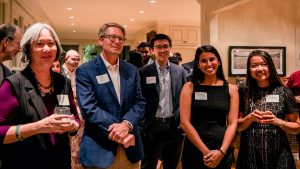
Thursday is a big day for Asian Americans at Carolina. That’s when the University’s largest ethnic community opens its long-awaited Asian American Center, with a director, a website, online programming and a $5 million fundraising goal.
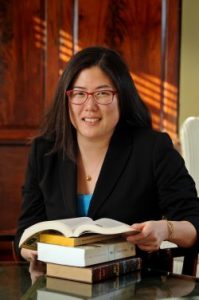
The Asian American Center was approved by the University Board of Trustees in January and established as a center in the provost’s office in July. The COVID-19 pandemic emerged between those milestones, though, complicating efforts to get the center underway. There may not be a building to open or a ribbon to cut — at least for now — but the Asian American community will have a center devoted to its culture and concerns.
“Starting a center in this year is a particular challenge because obviously everybody only exists online,” said Asian American Center Director Heidi Kim, associate professor in the English and comparative literature department in the College of Arts & Sciences. “But I am determined to do my best in this virtual environment.”
Kim will begin with a particularly timely first event, a livestream conversation about the documentary “I’m Not Racist … Am I?” at 7 p.m. Sept. 10. Featured speakers are executive producer Barb Lee ’88, founder and president of Point Made Films, and Michelle Robinson, associate professor of American studies in the College of Arts & Sciences. (When they register in advance, participants will receive an access code to watch the film for free.)
The event kicks off Anti-Blackness and Alliance: A Series on Asian-Black Race Relations, co-sponsored with the Carolina Asia Center. Other events in the series are a Sept. 30 talk by professor Iyko Day of Mount Holyoke College, a roundtable about Asian American hip hop and a panel discussion on “Rethinking the History of Alliance.”
“With the surge of anti-Asian racism that has come with the coronavirus, and with the heightened consciousness and self-scrutiny about race that has come with the Black Lives Matter protests, a lot of Asian Americans have been re-examining their place in the American racial hierarchy,” Kim said.
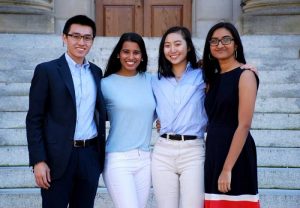
The right time
Despite the pandemic, the time is right for establishing a center for Asian Americans at Carolina, its supporters said. The Asian American population of the state has grown exponentially in recent decades, with an increase of 85% between 2000 and 2010 and nearly 50% since 2017, Kim said. At Carolina, 17% of all students as of fall 2019 and 18% of the current first-year class identify as Asian/Asian American as do about 10% of staff, 11% of faculty and 30% of post-doctoral fellows.
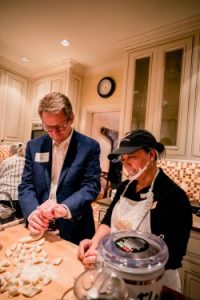
“Asian Americans are the fastest-growing minority in the state, so investing in an Asian American Center is a good idea,” said the student campaign’s first director Sean Nguyen, a senior from Tampa, Florida, and Morehead-Cain Scholar majoring in American history and statistics. “The center enriches Carolina as a campus because it exposes different constituents to Asian American culture and shows how they are part of the American narrative.”
Asian Americans make up “a very amorphous and diverse and not well understood population” with many different national origins, cultures, languages and religions, Kim said. “It’s certainly a community that has felt overlooked and underserved on campus.”
“We really don’t feel we have a sense of belonging on campus,” said Brianna Li, a junior from Cary majoring in computer science in the College of Arts & Sciences and co-director of strategic communications for the campaign. With the center, “we’ll have a community at Carolina that will feel more like home.”
A happy story
In a drive that began last summer, the student-led Asian American Center Campaign team has raised more than half of its $1.2 million goal for 2020. The amount needed to fully endow the center is $5 million.
The first gift came from Eugene Lao ’91, who co-founded the Asian Students Association — now known as the Asian American Students Association — at Carolina more than 30 years ago. Lao is now general counsel for Reltio and a partner in Red Dog Capital.
“I think it’s really important that Asian Americans have a center on campus that retains that institutional knowledge and tracks the progress that we’ve made, so that it doesn’t just come and go as a student class comes and goes,” Lao said. The center will help “people with that common experience and identity to be able to come together, to be able to have a voice on campus.”
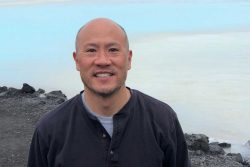
While the center is a virtual one so far, the goal is to one day have a place on campus, Kim said. “We don’t yet have a physical space, so another goal for this year is to get that established, so that when we’re all able to gather physically again — maybe even closer than 6 feet — that we will have a place where we can hold events and create a home for the Asian American community.”
Reaching this goal will take more money, more time and more distance from pandemic conditions, Kim said, but she’s pleased with the center’s progress so far.
“I really want to pay tribute to the students and alumni who campaigned for an Asian American Center because they were incredibly passionate and dedicated, and this center has come to life at record speed,” she said. “It’s a happy story. I feel like we need happy stories right now.”
By Susan Hudson, The Well
